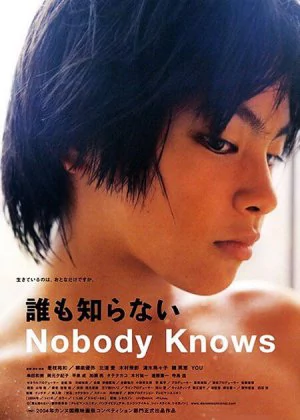Nobody Knows
Nobody Knows [Dare mo Shiranai] is a pivotal film in Hirokazu Koreeda's career. It transformed him from a strong niche interest into a veritable arthouse sensation, and he's still benefiting from that somewhat sudden rise in status to date. Such an upgrade often comes at a cost, and while I liked the film quite a bit the first time I watched it, I found it far removed from his best work. That was almost two decades ago though, so a revisit was long overdue, if only to see how one of Koreeda's most recognized works had held up over time. It turns out this is still a powerhouse film.
![screencap of Nobody Knows [Dare mo Shiranai]](/thumbs/img/articles/1200xauto/nobody-knows-1.webp)
Koreeda got big on the arthouse side of cinema. His films had always circled the drama genre, but documentary influences, arthouse aesthetics, and the odd stray genre injection had kept him from reaching a larger audience. With all those stripped away, Nobody Knows was the perfect film to bridge that final gap. It's a lengthy film that deals will social ills, focusing on some young children. It's the equivalent of Oscar bait, only for the Cannes audience. The film's saving grace is Koreeda's gentle and subtle direction, steering the film clear of overt sentimentality.
The film is based on a true story and tells a tragic tale, Koreeda's prior experience with documentaries is what helped him to overcome some of the genre's most common pitfalls. You could also chalk it up to more generic Japanese drama cliches of course, which tend to deal with trauma and tragedy in a different way than their European and American counterparts. The ending in particular is something that you would struggle to find anywhere outside of Japanese storytelling, but that is exactly what helps a film like this rise above its peers.
Akira is a young, 12-year-old boy who moves in with his single mom into a new apartment. Once settled, it becomes clear she has three more kids, which she keeps hidden from view. Without a father figure around, Akira has to help with taking care of his younger siblings, as his mom often leaves them alone for extended periods of time. When she announces she has a new boyfriend, she leaves her kids to fend for themselves. Akira does his best to ration the money and supplies, but when it's clear their mom isn't returning, he tries to come up with other ways to get food and essentials.
![screencap of Nobody Knows [Dare mo Shiranai]](/thumbs/img/articles/1200xauto/nobody-knows-2.webp)
It's not that Koreeda pays no attention to the visuals, but they're very low-key and kept rather subtle, to not detract too much from the drama. There are some pretty shots and the camera often lingers, going for that typical fly-on-the-wall experience, but Koreeda certainly didn't go out of his way to seek out beauty where there wasn't any. The film has a natural look, and while I generally prefer more stylized films, I do understand why Nobody Knows looks the way it does. It's not very remarkable, but it is quite functional and it still looks fine within its limitations.
The score is very scarce, which is also fully in line with the more natural style Koreeda was going for. It's mostly just ambient noises, with a very select amount of moments getting a sliver of musical backing. And even that is limited to the usual light piano and string music that is featured in most Japanese dramas. Again, looking at the rest of the film it's a choice that makes sense, though I feel a little extra attention to the score could've done the film some good. Music doesn't need to be loud or over-the-top to add character to a film, and Nobody Knows could've benefited from an additional quality injection.
Yuya Yagira won a Palme for his performance and that is well-deserved. It's not often that kids need to carry a film, it's even rarer to see them pull it off with such ease. All of the kids' performances are commendable though, so Koreeda no doubt deserves some of the credit here, as he coached them very well. You is also impressive in the mother role, as she is the obvious villain of the story, but she is never portrayed that way. It's not that I actively sympathized with her, but she clearly had problems of her own and simply wasn't fit to be a mother of four. Kudos to the cast.
![screencap of Nobody Knows [Dare mo Shiranai]](/thumbs/img/articles/1200xauto/nobody-knows-3.webp)
The film is quite long considering the material, but that's because Koreeda focuses more on the characters instead of the plot. There are a few twists and turns, but the story itself could've easily been dealt with within 90 minutes. By letting the scenes breathe and letting the camera linger, we get a better grasp of the characters and their little quirks and habits. If you like fast(er)-paced films that might be an issue, but people who are seasoned drama watchers shouldn't have too much of a problem. Do brace yourself for a pretty emotional finale though.
Nobody Knows is a pretty easy-going film. There's hardly anything there to put people off, which is probably why it became Koreeda's definite breakthrough project. The overall quality is well above average, with peaks for the performances and the narrative drama, slowly working itself up to an emotional crescendo without ever getting sentimental. It's not my favorite Koreeda, for that it's just a little too inconspicuous and unadventurous, but it's difficult to deny the film's inherent qualities and it still got to me the second time around. If you want to get into Japanese drama, it's an ideal starter film.
